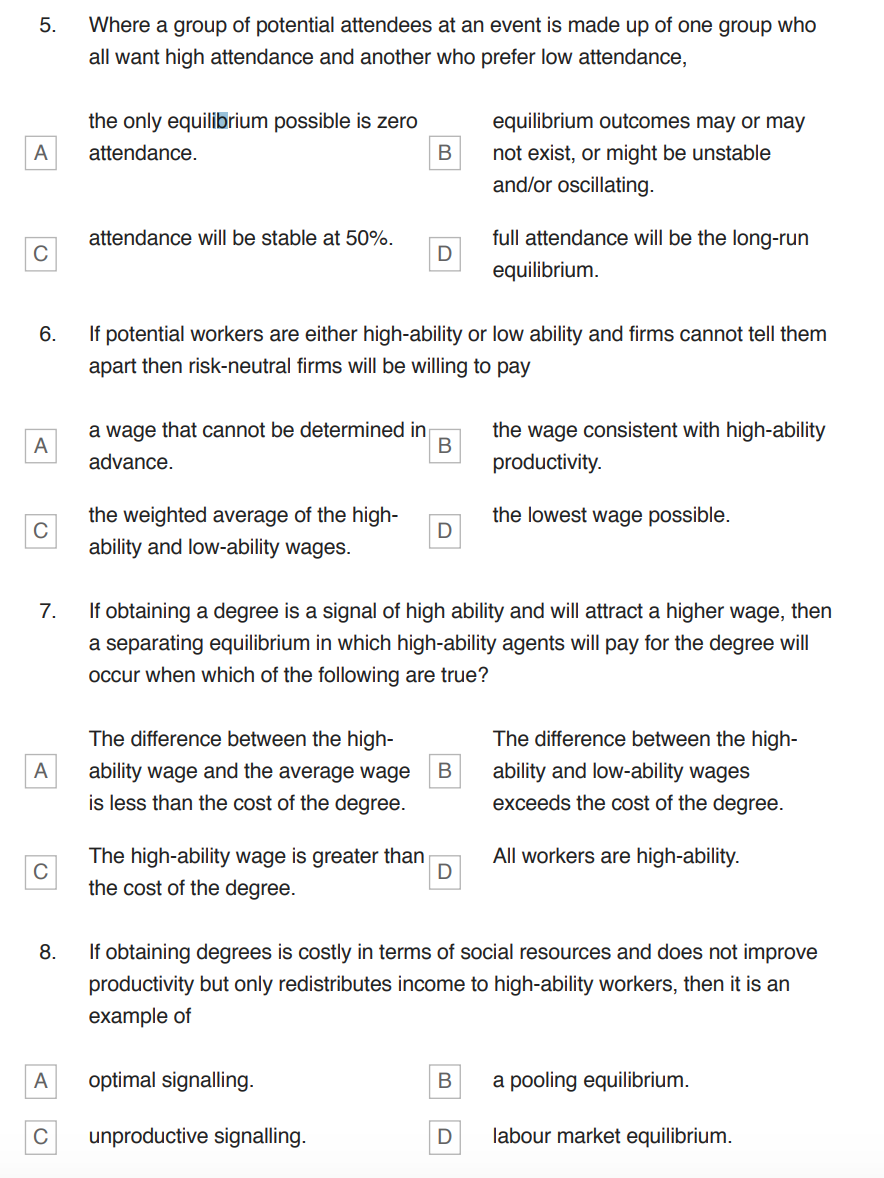5. A C Where a group of potential attendees at an event is made up of one group who all want high attendance and another who prefer low attendance, the only equilibrium possible is zero attendance. attendance will be stable at 50%. B D equilibrium outcomes may or may not exist, or might be unstable and/or oscillating. full attendance will be the long-run equilibrium.
5. A C Where a group of potential attendees at an event is made up of one group who all want high attendance and another who prefer low attendance, the only equilibrium possible is zero attendance. attendance will be stable at 50%. B D equilibrium outcomes may or may not exist, or might be unstable and/or oscillating. full attendance will be the long-run equilibrium.
Chapter8: Market Failure
Section: Chapter Questions
Problem 9P
Related questions
Question
Please answer the correct please ASAP explain please. 5 6 7 8
Don't answer by pen paper please answer ASAP

Transcribed Image Text:5.
A
C
A
C
A
C
Where a group of potential attendees at an event is made up of one group who
all want high attendance and another who prefer low attendance,
the only equilibrium possible is zero
attendance.
6.
If potential workers are either high-ability or low ability and firms cannot tell them
apart then risk-neutral firms will be willing to pay
A
attendance will be stable at 50%.
C
the weighted average of the high-
ability and low-ability wages.
a wage that cannot be determined in
advance.
B
B
The difference between the high-
ability wage and the average wage
is less than the cost of the degree.
D
7.
If obtaining a degree is a signal of high ability and will attract a higher wage, then
a separating equilibrium in which high-ability agents will pay for the degree will
occur when which of the following are true?
optimal signalling.
D
unproductive signalling.
The high-ability wage is greater than
the cost of the degree.
D
B
equilibrium outcomes may or may
not exist, or might be unstable
and/or oscillating.
full attendance will be the long-run
equilibrium.
8.
If obtaining degrees is costly in terms of social resources and does not improve
productivity but only redistributes income to high-ability workers, then it is an
example of
B
the wage consistent with high-ability
productivity.
the lowest wage possible.
The difference between the high-
ability and low-ability wages
exceeds the cost of the degree.
All workers are high-ability.
a pooling equilibrium.
D labour market equilibrium.
Expert Solution
This question has been solved!
Explore an expertly crafted, step-by-step solution for a thorough understanding of key concepts.
Step by step
Solved in 5 steps

Knowledge Booster
Learn more about
Need a deep-dive on the concept behind this application? Look no further. Learn more about this topic, economics and related others by exploring similar questions and additional content below.Recommended textbooks for you

Exploring Economics
Economics
ISBN:
9781544336329
Author:
Robert L. Sexton
Publisher:
SAGE Publications, Inc

Principles of Economics 2e
Economics
ISBN:
9781947172364
Author:
Steven A. Greenlaw; David Shapiro
Publisher:
OpenStax

Exploring Economics
Economics
ISBN:
9781544336329
Author:
Robert L. Sexton
Publisher:
SAGE Publications, Inc

Principles of Economics 2e
Economics
ISBN:
9781947172364
Author:
Steven A. Greenlaw; David Shapiro
Publisher:
OpenStax